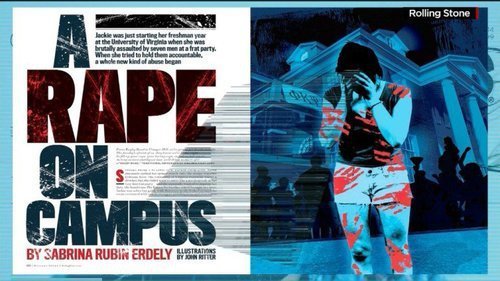


By Steve Sailer
12/04/2014
From Salon:
WEDNESDAY, DEC 3, 2014 08:09 AM PSTFrom the UVA exposé to “Serial” to “In Cold Blood,” it’s hard for us to accept holes in the stories that rivet us
ERIN KEANE
Rolling Stone’s UVA rape story backlash: When narratives are so compelling that we don’t notice unbalanced reporting
I started reading Sabrina Rubin Erdely’s Rolling Stone story “A Rape on Campus: A Brutal Assault and Struggle for Justice at UVA” expecting another version of a story I’d read, depressingly, so many times before of unresolved sexual assaults on campus. But from the first paragraph, I was hooked on overachieving, finally-able-to-cut-loose Jackie — the way she slyly ditches her spiked drink so she can stay sober but not look like a scared freshman, her excitement over her first big party, what she wore and how she fixed her hair. Erdely brings Jackie right into my living room with me and when she is gang raped in the frat house all of the breath rushes out of my lungs. I gulp the rest of the story down and by the end I am stunned. The searing unfairness of how Jackie has been treated by the people of an institution she trusted, where she could have felt liberated and empowered instead, is simply crushing. Not only am I devastated on her behalf, I’m also devastated on behalf of every girl and woman who’s ever been brutalized like that. That’s what a good story written extremely well should do. That’s art.
That I don’t even notice that Erdely never mentions trying to get an interview with the men Jackie says raped her until I read the follow-up pieces this week speaks volumes about how well Erdely crafted the narrative. …
But this isn’t Jackie’s memoir. “A Rape on Campus” is journalism, and now the story isn’t just about Jackie, it’s about the concessions Erdely did or did not make in pursuit of a powerful story, which has now sparked a police investigation, a frat suspension and institutional reforms.
This is becoming the face-saving climb-down out for the media: let’s have a boring public debate over this one technical issue of proper journalistic methodology.
The emotional payoff for being invested in Jackie is intense and ongoing. Jackie isn’t a character, she’s a real person. But in the case of how her story was written and read, she had to be a little bit of both in order to transcend campus apocrypha and gain the power to force a tradition-bound institution to face its toxic culture.
Okaaaay …
Personally, I think we should face the toxic culture in the national media that allowed a story like this to be promoted widely with barely a hint of skepticism for at least 10 days. And I didn’t even have to make stuff up to reach that awareness.
… And so it’s noteworthy that decades after Truman Capote published “In Cold Blood,” his 1966 nonfiction book that redefined investigative crime reporting with its narrative exploration of the 1959 murders of Holcomb, Kansas, farmer Herbert Clutter and his family, his conclusions are being challenged head-on. …Every ethical reporter believes he or she is showing the facts in a clear landscape, unshadowed by discarded sources, ignored leads or deliberately softened edges. But a “just the facts” approach to an in-depth investigation rarely breaks through the noise to have a real impact. Humans crave story, and the literary elements of storytelling — careful character development, significant detail, pace — demand rigorous and frequent checking in long-form journalism because they have so much power to influence how we read the facts. But if Erdely’s telling of Jackie’s experience at UVA, even without the pursuit of the perspective of her alleged rapists, rings true enough to launch a thorough investigation by Charlottesville police, a second chapter — whatever new facts it ends up revealing — will come.
We are already onto a second chapter, but the dominant forces are trying to mold it into a boring chapter about how many voice mail messages you should leave rather than one about how hate porn has become so welcome by the press.